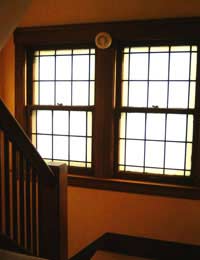Personal Safety In The Home

It’s a fact: you are twenty times more likely to suffer a fatal accident at home than to win the National Lottery (RoSPA). In the UK, 2.7 million people suffer a serious accident at home every year. It could be you! But it doesn’t have to be – not if you take the right precautions. Here’s a roundup of home safety tips – read them in conjunction with the room-specific features on the site (use the left-hand menu).
What are the Risks?
Which is the most dangerous room in your home? Statistics show it’s the Kitchen (262,000 accidents in 2002), followed by Bedroom (231,000 in 2002), Bathroom (94,000 in 2002), and Attic (6,000 in 2002). Yes, we’ve heard the 'cereal' killer jokes, but the kitchen can be an extremely dangerous place – people suffer falls, burns and electric shocks there.Essential Home Safety
You can read about home protection and room-specific safety in the related features on this site. Here’s a list of safety essentials in the home:- Carry out safety assessments in critical areas (kitchen, bathroom, living room, garden). You can quickly identify and remedy safety risks like loose carpets and rugs, fire risks, obstructions to exits, open water, exposed pipes, non-safety glass, unlocked chemical cupboards and misplaced appliances (remove those with long wires in the kitchen, and any mains-operated appliances in the bathroom). If you have children, read our article on Child-proofing your Home.
- Install a burglar alarm – preferably one with an external box, to indicate to opportunists that your home is protected. You can buy wired-in alarms (harder to fit) or wireless alarms (easier to fit, but less reliable) to cover the entrances and exits to your home (include ground-floor windows). If your home is at high risk, you could also install CCTV cameras, electronic gates and shutters. See our article on Home Protection Systems for more information.
- Prepare an emergency procedure and brief the family on what to do in case of fire, flood, or evacuation. It may seem a little crazy to pack an Emergency Kit for your family but you’ll thank us when you need it! Your personal Emergency Kit depends on (a) your circumstances and (b) your family’s requirements. If you’re in a flood zone you might already have a box of waterproofs, important documents and laminated phone numbers; people in blocks of flats already know how to exit the building in case of emergency. If any of your children have medical conditions then it is a good idea to keep spare medicines or equipment easily to hand. Your procedure should be familiar to the family. A good policy identifies exits (including windows and first-floor routes) and meeting places.
- Install a smoke alarm on each floor. Pick somewhere that isn’t too close to your kitchen or open fire (where you might expect occasional smoke) and test the batteries every month, replacing them once a year. In a big house, or with children present, you may want to consider buying a fire extinguisher and blanket – put them somewhere easily accessible.
- Safety-inspect your garden. Ponds and young children don’t combine well, and children can drown in a few inches of water – so fence off or fill-in any water-features or ponds. Keep your garage and shed tidy, with sharp or heavy tools, chemicals and building equipment kept out of children’s reach. If you use weedkiller, read the instructions carefully and keep the children and pets indoors until the treated area is safe for them to walk on.
Related Articles in the 'Safety At Home' Category...


Re: What is Stranger Danger
Hi don’t like walking around town waking to swimming Alford
Re: The Role of Victim Support
What should I do if ,lets say I pay for the house which is on rent and then ,the landlord fails to vacate the house? You call him…
Re: Personal Safety on the Street: How Much Should I Worry?
None - Your Question:I have been unfairly cautioned by police after an attack.The man who…
Re: Personal Safety on the Street: How Much Should I Worry?
I have been unfairly cautioned by police after an attack.The man who punched me lied to…
Re: Personal Safety Abroad
Can I get justice for this even if the woman that destroyed me is dead and I have no proof of this because I never told anyone till now.So…
Re: Learning About Self Defence
I really find these articles very helpful as far as safety is concerned. I appreciate if more of such articles are sent to my mail…
Re: What is Stranger Danger
Some tips on how to keep your young ones safe: 1. If you do feel uncomfortable about somebody talking to you just kindly say. I promise…
Re: What is Stranger Danger
I think this is a great website for to make sure that children are safe in this world. They should be free to live life and go out and…
Re: What is Street Harassment?
Highland S - Your Question:I have had two recent frightening experiences when walking my dogs alone. The man had clearly been…
Re: What is Street Harassment?
I have had two recent frightening experiences when walking my dogs alone. The man had clearly been drinking on both occasions. He…